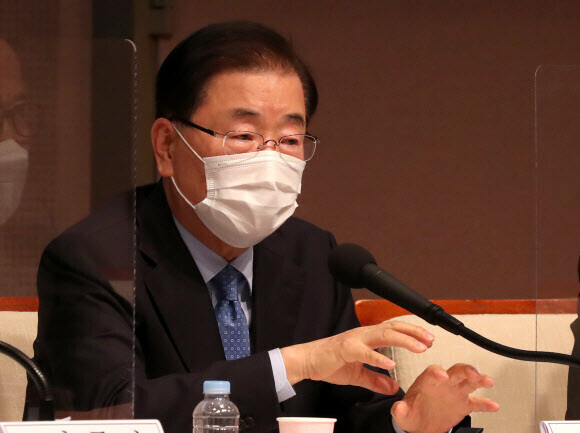hankyoreh
Links to other country sites 다른 나라 사이트 링크
Japan not qualified to insist on its position on "comfort women" issue, S. Korean foreign minister says

South Korean Ministry of Foreign Affairs described being “quite astonished” by Japan’s negotiation approach during his time as director of the Blue House National Security Office.
In several rounds of discussions with Tokyo over what he called “very realistic alternatives” for resolving the issue of Japanese military sexual slavery, the Japanese side “continued to insist solely on their own position,” he recalled.
In an invitation Kwanhun Club discussion held at the Korea Press Center on Wednesday, Chung shared this response when asked what sort of efforts he had made to resolve the military sexual slavery issue under the Moon Jae-in administration.
Chung said he had “presented Japan with several very realistic alternatives” that would be acceptable to the survivors without overturning an intergovernmental agreement reached between the two sides’ governments in 2015.
“Every time I went, Japan refused to accept it. They told me to come back with a better alternative,” he recalled.
“Whenever some progress would be made [in discussions], I would bring them that ‘improved’ plan, and they’d say, ‘No, bring us something better,’” he said.
Chung went on to say that he had “traveled to Japan behind the scenes several times while I was National Security Office director so I could meet with senior Japanese officials to resolve this issue.”
“Every time, I would go with some very realistic plan, and I was quite astonished by Japan’s approach to negotiating,” he explained.
He interpreted Japan’s continued insistence on its own position as a signal that Japan wanted to abandon negotiations.
Chung also explained that the Japanese government was bad-mouthing Seoul to others, making the “incoherent” claim that it “would be violating international law if it did not observe the intergovernmental agreement.”
Noting the root cause and basic nature of the military sexual slavery issue, he added, “Is Japan really qualified to behave that way?” He did not specify what kind of proposals he had presented to Japan.
While Chung remained calm throughout the discussion, he showed some emotion when talking about the process of his discussions with Japan.
“I’m sorry for getting so heated,” he said as he finished his response.
“There are a lot of things that I’d like to say about the comfort women issue,” he added.
It is unclear whether Chung was thinking of the result of a lawsuit filed by 20 plaintiffs — including the late Kwak Ye-nam and Kim Bok-dong, as well as the family members of other military sexual slavery victims — to demand compensation from Japan. But it is seen as unusual for a foreign minister to vocally criticize the attitude of another country while talking about past discussions held confidentially between the two sides.
Ahead of his remarks that day, Chung shared a hopeful message.
“I find it unfortunate that South Korea-Japan relations have come across in such an excessively negative light recently because of the differences in our basic perceptions of historical issues, and I’d like to meet with the Japanese foreign minister as soon as possible so that we can perhaps resolve these issues through dialogue,” he said.
He also said that Japan “does not appear to be prepared to do that yet.”
Although he described Japan as “our closest neighbor” and “a partner with whom we need to cooperate for the sake of peace and stability on the Korean Peninsula,” it appears unlikely that his remarks will have a positive impact in improving bilateral ties.
After the discussion, Chung was asked about his position on the court’s ruling against the comfort women survivors.
“It was just now reported to me. I’ll need to review it,” he said.
By Kim Ji-eun, staff reporter
Please direct comments or questions to [english@hani.co.kr]

Editorial・opinion
![[Editorial] Yoon must halt procurement of SM-3 interceptor missiles [Editorial] Yoon must halt procurement of SM-3 interceptor missiles](https://flexible.img.hani.co.kr/flexible/normal/500/300/imgdb/child/2024/0501/17145495551605_1717145495195344.jpg) [Editorial] Yoon must halt procurement of SM-3 interceptor missiles
[Editorial] Yoon must halt procurement of SM-3 interceptor missiles![[Guest essay] Maybe Korea’s rapid population decline is an opportunity, not a crisis [Guest essay] Maybe Korea’s rapid population decline is an opportunity, not a crisis](https://flexible.img.hani.co.kr/flexible/normal/500/300/imgdb/original/2024/0430/9417144634983596.jpg) [Guest essay] Maybe Korea’s rapid population decline is an opportunity, not a crisis
[Guest essay] Maybe Korea’s rapid population decline is an opportunity, not a crisis- [Column] Can Yoon steer diplomacy with Russia, China back on track?
- [Column] Season 2 of special prosecutor probe may be coming to Korea soon
- [Column] Park Geun-hye déjà vu in Yoon Suk-yeol
- [Editorial] New weight of N. Korea’s nuclear threats makes dialogue all the more urgent
- [Guest essay] The real reason Korea’s new right wants to dub Rhee a founding father
- [Column] ‘Choson’: Is it time we start referring to N. Korea in its own terms?
- [Editorial] Japan’s rewriting of history with Korea has gone too far
- [Column] The president’s questionable capacity for dialogue
Most viewed articles
- 1Months and months of overdue wages are pushing migrant workers in Korea into debt
- 2At heart of West’s handwringing over Chinese ‘overcapacity,’ a battle to lead key future industries
- 3Seoul getting its first-ever vertical farm
- 4[Editorial] Yoon must halt procurement of SM-3 interceptor missiles
- 5Fruitless Yoon-Lee summit inflames partisan tensions in Korea
- 6Trump asks why US would defend Korea, hints at hiking Seoul’s defense cost burden
- 7[Editorial] When the choice is kids or career, Korea will never overcome birth rate woes
- 8Dermatology, plastic surgery drove record medical tourism to Korea in 2023
- 9[Column] For K-pop idols, is all love forbidden love?
- 10[Editorial] New weight of N. Korea’s nuclear threats makes dialogue all the more urgent